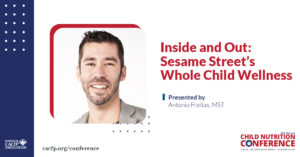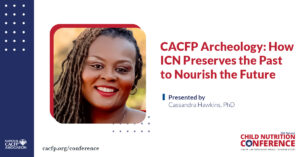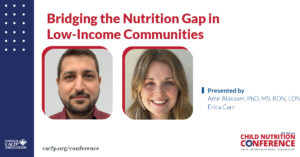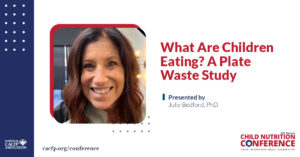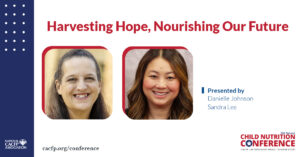2025 Research & Resources
Inside and Out: Sesame Street’s Whole Child Wellness
Every day, you make a difference in the “circle of care” by helping kids and families grow smarter, stronger, and kinder. From celebrating joyful everyday moments to teaching skills for managing feelings or signs of serious mental health challenges, dive into ways to use the free, research-based, bilingual resources in early learning spaces to help children, families, and community providers with whole-child wellness.
Read MoreCACFP Archeology: How ICN Preserves the Past to Nourish the Future
Explore the history and insights preserved in the Child Nutrition Archives at the Institute of Child Nutrition. Learn how these resources help shape child nutrition programs, guide policy development, and support the mission of CACFP. Additionally, see how these resources empower professionals, contribute to research, and enhance program outcomes.
Read MoreBridging the Nutrition Gap in Low-Income Communities
Food insecurity and limited access to quality nutrition education contribute to poor health outcomes in underserved communities. In response, a nutrition education program was implemented among children in Chattanooga, TN. From cooking demonstrations to meal affordability exposure, discover how the three intervention levels fostered sustainable health behavior changes in low-income communities.
Read MoreWhat Are Children Eating? A Plate Waste Study
A two-year plate waste study of SFSP and CACFP participants revealed a great deal of information, including what children were and were not eating. Learn about the subsequent adjustments that were made and what reevaluations looked like.
Read MoreSupporting Food Security in Your Local Community
Seventeen percent of households with children and upwards of 30% of child care providers deal with the challenge of food insecurity in their personal lives. Learn and discuss ways to reduce stigma amongst food-insecure populations and better support food security within local communities.
Read MorePlayful Activities for Teaching Healthy Diets
The way we feed children is crucial for their development and it is also important to help children learn how to have a healthy relationship with food. Hear how you can add playful learning strategies into daily routines that will accomplish both of these objectives.
Read MoreNutrition to Youth Development: An Extension’s Role in Schools
Discover the benefits of partnering and connecting with your state’s extension services to enhance school nutrition, gardening, physical activities, and youth development programs. Learn how extension services can begin to help improve community well-being through innovative solutions in education and fostering impactful collaborations, ultimately enriching student education and health.
Read MoreThe Numbers Behind the Story: Unveiling Insights with Data
Use Data to Drive Action. That’s California’s Health and Human Services team’s guiding principle. Discover how the CACFP Branch created a Data Innovation Unit to explore ways to provide data analysis to make better-informed program decisions, identify methods to measure program improvements, and create data stories connecting CACFP to the communities served.
Read MoreHunger, Health and How Early Care Settings Can Help
While hunger and nutrition insecurity pose similarities, they also have distinct differences. Additionally, a lack of access to healthy food affects early childhood development. Discover ways of increasing food security and supporting early care and education professionals to implement strategies critical for continued nutrition access.
Read MoreHarvesting Hope, Nourishing Our Future
Learn how a Harvest of the Month program can incorporate nutrition education while encompassing early education foundations. Get inspiration and a guide to hands-on activities and resources to start your own program and create a meaningful learning environment that embeds healthy habits throughout the day.
Read More
